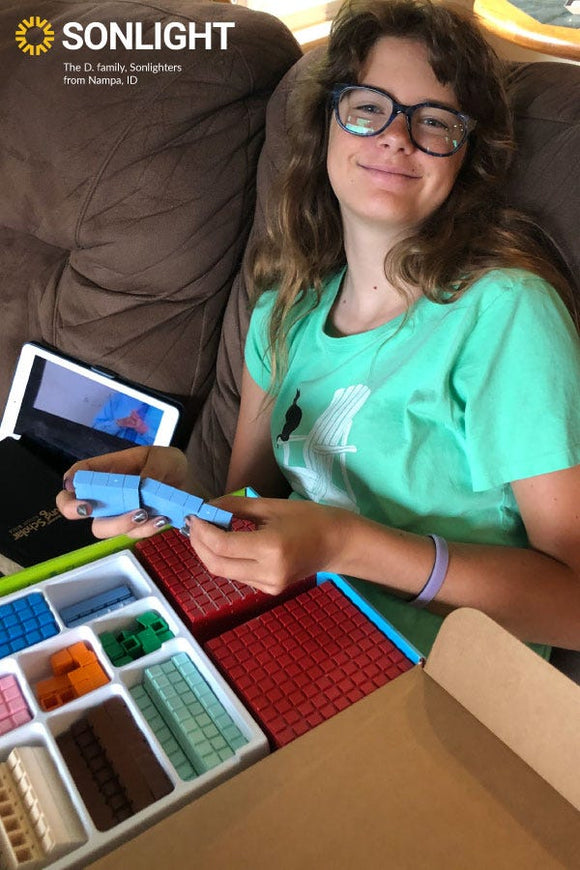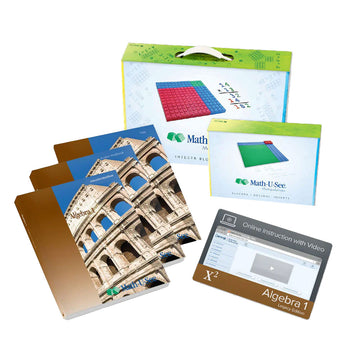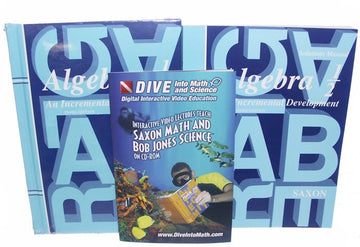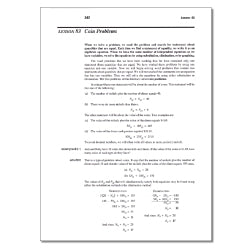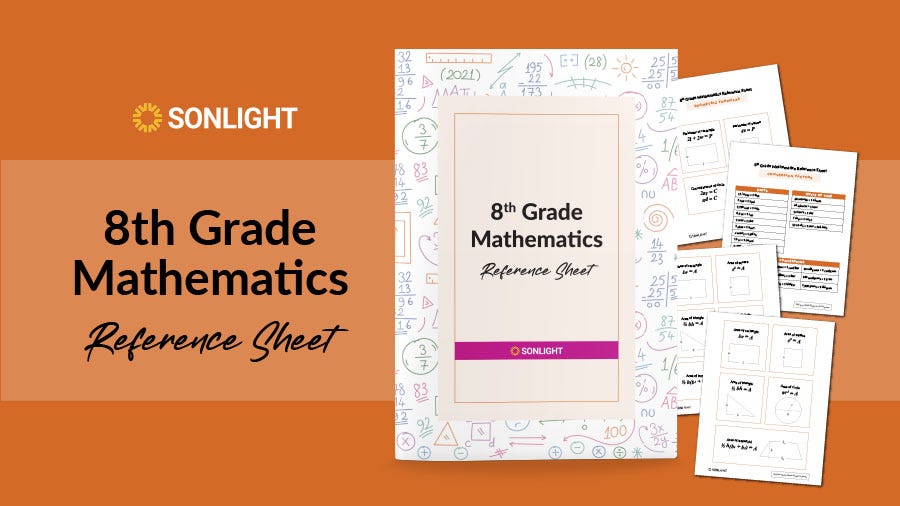8th Grade Math
Some students entering eighth grade are ready to begin algebra while others are not. The way to tell is to consider a student’s current math abilities.
In order to be successful in algebra, students should already have a strong foundation in basic math facts, including place value, fractions, decimals, and percentages. They should understand positive and negative numbers and be able to add, subtract, multiply, and divide them. Students should be familiar with roots and radicals, additive and multiplicative inverses, order of operations, and the associative, commutative, and distributive properties.
If your eighth grade student has not mastered these topics, instead of moving into algebra, consider these alternative eighth grade math programs:
Eighth Grade Math Curriculum
Math for 8th graders is not a subject where you'll want to wing it. You’ll want a trusted curriculum to guide the way, cover everything your child needs, and teach math in a logically sequential order.
Each option below has everything that you need for an entire school year of eighth grade math instruction.
Dig deeper by referencing the Homeschool Math Comparison Chart on this main math page. And, to further compare these programs, see the detailed scope and sequence of each. But if you still feel unsure, an Advisor can help you identify which program is a good fit for you.
If you’re not sure these are the right level for your child, use the math placement tests here to confirm the best level.
1 Math-U-See Algebra 1
Math-U-See's Algebra 1 uses a mastery-based approach allowing students to focus on one concept at a time before moving on. This program is ideal for students who thrive with a visual, concept-focused learning path that prefer to move at their own pace.
Algebra 1 builds a strong foundation in algebraic concepts through clear instruction and hands-on learning. Designed for middle and high school students, this program emphasizes understanding over memorization, using manipulatives and real-world application problems. Key topics include solving equations, graphing, factoring, and quadratic functions.
2 Saxon Math Algebra 1 Program
If your student successfully completed Saxon 8/7 they can move directly to Saxon's Algebra 1. If more practice is needed, then opt for Algebra 1/2 for additional review.
Saxon's Algebra 1 is more structured and uses a spiral-based approach where concepts are introduced incrementally and reviewed continuously. This program suits students that benefit from continual practice and structured review.
Topics covered in Saxon's Algebra 1 include signed numbers, exponents and roots, absolute value, equations and inequalities, polynomials, graphs, factoring, quadratic equations and more.
8th Grade Math Lesson & Worksheet Samples
Worksheets in Eighth Grade Math Curriculum
- Math-U-See includes a student workbook with both practice and review/application worksheets for each lesson. Students complete only as many problems as necessary to prove mastery of the lesson.
- Saxon uses a textbook only. So a Saxon student copies problems to notebook paper and works them there instead of in a workbook. Basically, the student creates their own eighth grade math worksheets.
8th Grade Math Lessons
Math-U-See includes video lessons (both DVD and streamable), so you know exactly how to teach each lesson. Also there is a printed Instruction Manual with more help for teaching the math lessons.
- Watch the video below for a demonstration of a Math-U-See Algebra 1 lesson.
Saxon Math Homeschool has lessons in the text and are designed to be used independently by the student. There are video lessons available on the DIVE into Math CDs which walk your student through the math.
8th Grade Math Reference Chart
Download, save, and print the 8th Grade Mathematics Reference Sheet to keep these key formulas handy. Includes formulas for perimeter of rectangle and square, circumference of circle, area of rectangle, square, triangle, circle, trapezoid and formulas for volume and surface area.
8th Grade Math
Problems & Equations
For algebra 1, eighth grade students will learn to work these kinds of problems and equations:
- solving equations and inequalities in one and two variables
- solving literal equations
- working with ratios and proportions
- graphing linear equations and quadratic equations
- factoring polynomials and trinomials
8th Grade Math
Numbers & Operations
Eighth graders will study these kinds of numbers:
- square roots
- cube roots
- rational and irrational numbers
- exponents
The 4 essential operations are
- addition
- subtraction
- multiplication
- division
In eighth grade, students learn how to order these operations using the mnemonic PEMDAS: Please excuse my dear Aunt Sally. A fun math activity is to ask your child to create an original mnemonic for PEMDAS. The goofier the better because it will be more memorable.
P - parentheses
E - exponent
M - multiplication
D - division
A - addition
S - subtraction
8th Grade Math
Algebra 1
As your eighth grader tackles linear equations, systems of equations, and polynomials, they’re building critical thinking and problem-solving skills that form the backbone of high school math and beyond. Word problems continue to play a key role, helping students apply abstract concepts to real-life situations while preparing them for the layered reasoning required in geometry, advanced algebra, and future STEM studies.
Eighth Grade Math Standards
Math standards are set by state departments of education. But they are typically easy to find online. Simply search [state] 8th grade math standards to find your state’s particular guidance.
You can read the Common Core Standards here. In grade 8, the focus is linear algebra and linear functions.
For math curriculum that meets Common Core standards, opt for one of these programs:
- Math-U-See (K-12th grade)
- Saxon Math Homeschool (K-12th grade)
Please note that while these programs cover the standards, they are presented in a slightly different order than prescribed in Common Core. So a certain topic may be assigned to 2nd grade in Common Core but is covered in 3rd or 1st grade in a certain curriculum. If Common Core Standards are important to you, simply remember that as long as you stick with the same program over many years, your child will eventually cover all of the concepts.
Eighth Grade Math State Tests
The Every Student Succeeds Act (ESSA) was signed into law on December 10, 2015 as an updated version of the 2002 No Child Left Behind (NCLB) Act. This act requires states to test students in grades 3-8 annually in math and language arts. As of 2025, states are actively implementing and updating their ESSA plans.
States can set their own standards for these tests, but they are required to be “challenging.” Many states have opted to use Common Core standards. Since each state is different, it’s best to go directly to the particular state department of education website for information about your state’s eighth grade math.
Achieve.org offers data about the various state mandated tests to measure math mastery. Read their math policy report here. Algebra 1 is a key math marker, and thus many states give students an end of course test in high school on that particular topic.
Eighth Grade Math Vocabulary
Here’s a list of key vocabulary for eighth grade math. Any good eighth grade math curriculum will teach students the meanings and applications of these terms.
- cartesian coordinates
- linear equation
- quadratic equation
- substitution
- factoring
- balancing
- substitution
- exponents
- scientific notation
- polynomials
- trinomials
- coefficient
- rational numbers
- irrational numbers
- commutative property
- associative property
- distributive property
- order of operations
- slope-intercept
- square root
- base (for example, base 10)
- ellipse
- parabola
- hyperbola
- probability
- statistics
